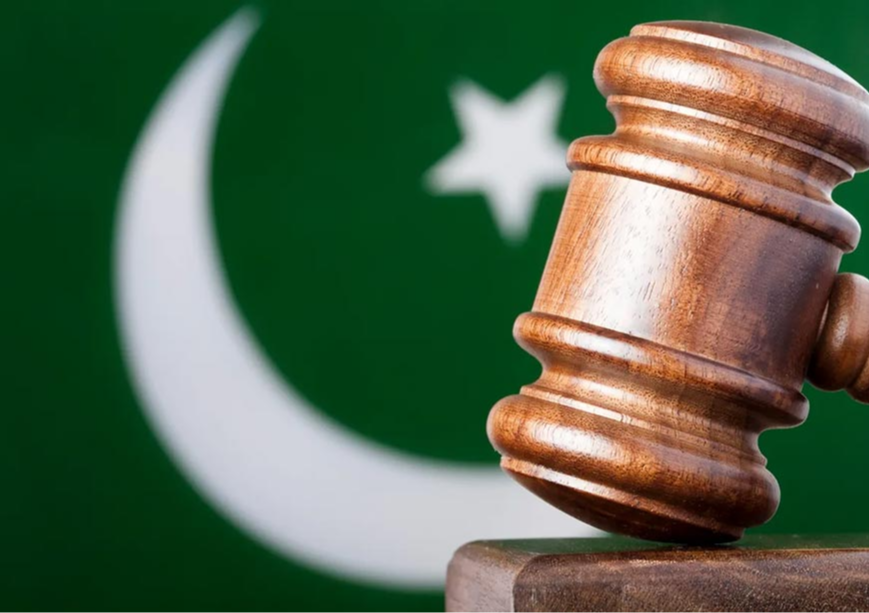-
CENTRES
Progammes & Centres
Location
As Pakistan ushers in a new executive, backed by a fractured legislature, its judiciary remains survivalist

Image Source: iStock
On 4 March 2024, Shahbaz Sharif took oath as the 24th Prime Minister of Pakistan, following a surprise-ridden election. While the role of the Pakistan Army in interfering with the electoral process has been widely analysed, it is the Pakistan judiciary which came full circle—from disqualifying Nawaz Sharif as PM in 2017 and enabling Imran Khan’s appointment to the post in 2018 to enabling Khan’s removal in 2022 and disabling his party’s electoral apparatus in 2023, to finally re-enabling Nawaz Sharif’s return to the National Assembly in 2024 with the junior Sharif as PM. The 2018-2024 period has proven to be a microcosm of the Pakistan judiciary’s historical pattern of engagement with the country’s polity. However, what has driven the judiciary to behave in such sweepingly contradictory terms? Throughout its history, the Pakistan judiciary, especially its Supreme Court, has been driven by what this article terms a “dual-survivalist” approach.
Both across its history and in the current hybrid regime, the Pakistan judiciary has displayed this dual-survivalist approach, evincing its own form of hybridity. More often than not, however, it has prioritised institutional survival.
As Pakistan dealt with the military’s pervasive interference in the state polity soon after independence, the judiciary, in particular, displayed a categorical willingness to legally validate Ayub Khan’s martial law (Dosso vs Federation of Pakistan) by applying the doctrine of necessity. The then Chief Justice of Pakistan Muhammad Munir later justified pro-establishment decisions as being necessary to save the judiciary from ‘annihilation’ and ‘abolishment’. In his seminal history of Pakistan’s judiciary, Hamid Khan shows that the judiciary’s enthusiasm in applying the doctrine of necessity during military rule was linked to its “misunderstanding that after rendering extraordinary service, the military would…share power with the judiciary”. This was especially exemplified by the judiciary’s compliance in the sham trial of Zulfiqar Ali Bhutto in 1978 and his eventual execution. While the judiciary arguably reached its nadir during the military regimes of Zia-ul-Haq and Pervez Musharraf, the 2007 Lawyers’ Movement provided it the latitude to regain at least some of its lost credibility, evident in its pro-activeness in tackling political corruption.
The then Chief Justice of Pakistan Muhammad Munir later justified pro-establishment decisions as being necessary to save the judiciary from ‘annihilation’ and ‘abolishment’.
However, in the era of the ‘hybrid regime’, the judiciary displayed its willingness to aid the establishment in multiple cases. Prominent among these was the Panama Papers case (2017), about Article 62(1)(f) of the Pakistan Constitution. Here, the SCP declared that the then-PM, Nawaz Sharif, was not “sadiq” (truthful) and “ameen” (faithful), disqualified him from the post of premier, and subsequently rendered Sharif ineligible to run for office, for life. Given the conviction with which the Pakistan Army was seeking to replace Sharif (its old bete noire) with Imran Khan (then perceived to be more pliable), the Court’s judgement effectively enabled the Army’s politics. Even earlier in the twilight of the Nawaz years, the Court had displayed a keenness to unseat/disqualify politicians (especially from the PML-N).
Whenever the judiciary feels threatened by the establishment, it “withdraws into a shell”, as Khan too asserts. It is after the threat passes (as the establishment’s preferences change), that the Supreme Court looks to revisit any older ill-reasoned judgements passed for institutional survival. While correlation does not imply causation, the consistency in the judiciary’s behaviour indicates the closeness of the two, as evidenced by the following cases. As recently as the 6 of March, 2024, the Supreme Court reassessed its judgement in ZAB vs State, admitting that the former Prime Minister had not received a fair trial. This mirrored the Court’s resurgent pro-activeness in 1972 in the immediate post-Yahya Khan period when the Court had undone its Dosso judgement in Asma Jilani vs Government of Punjab (apparently finding itself secure in the military’s considerable loss of face following the 1971 war, until Zia-ul-Haq’s tenure as Army Chief). More recently, in the run-up to the February 2024 elections, the Supreme Court undid the lifetime ineligibility of Nawaz Sharif, reading down its erstwhile strict interpretation of “sadiq” and “ameen”. While the Pakistani press noted this to be a ‘belated correction’, the verdict came at a time which again suited the Pakistan Army (virulently anti-Imran Khan by late 2023). Effectively then, while the SCP’s correction served juridical survival by undoing its older judgements that were considered bad in law, its 2024 verdict ultimately pandered to institutional survival by placating the establishment’s needs.
While correlation does not imply causation, the consistency in the judiciary’s behaviour indicates the closeness of the two, as evidenced by the following cases.
As Pakistan stepped out of its post-2007 optimism into a period of hybrid governance (civilian leaders backed by the Army), successive CJPs have, in effect, aided the establishment while sporadically taking independent stances. The same hybridity is displayed by the incumbent Chief Justice Qazi Faiz Isa.
Allowing his wife to stand beside him during his oath in September 2023 (a first in Pakistan’s history), Justice Isa pandered to juridical survival by re-asserting his own 2019 judgement (as SC judge) that the “Constitution emphatically prohibits members of the Armed Forces from engaging in any kind of political activity.” However, by January 2024, Justice Isa led the SCP bench which stripped the Pakistan Tehreek-e-Insaaf of its election symbol, while the lower courts convicted and sentenced Imran Khan in numerous cases, all within one week. Moreover, even as Justice Isa gave the Pakistani Supreme Court its first woman registrar, the SCP drew public ire in the Iddat case as it declared Bushra Bibi’s marriage to Imran Khan, as “un-Islamic”, dealing “a blow to women’s rights to dignity and privacy”. The Iddat case marked a new low in the judiciary’s history, reeking of the establishment’s desperation to prolong Khan’s exclusion from the electoral stage by either exploiting or manufacturing breaches of law. The judiciary’s contemporary hybridity is more evident in other recent cases:
Institutional survival:In December 2023, the SCP under Justice Isa allowed the trial of over 100 civilians in military courts—those arrested for their involvement in the (hitherto unseen) attacks on military installations on 9 May (including a large number of Imran Khan’s supporters). It scrapped its own 23 October ruling wherein it had laid down that civilians would be tried in civil courts. Although the December verdict was conditional on the military court’s final order being vetted by the SC, it breached the general principle of military courts holding no jurisdiction over civilians (Deceaux Principles). Indeed, the PTI too had characterised the verdict as “a judicial coup…and a violation of fundamental human rights.” Given the unprecedented nature of the 9th May protests, the case was unarguably sensitive for the Pakistan Army, requiring the judiciary to sacrifice long-standing principles at the altar of institutional survival. Additionally, the fact that then-PM Shehbaz Sharif advocated for trying civilians under the Army Act reflected the influence of the Army’s priorities.
The Iddat case marked a new low in the judiciary’s history, reeking of the establishment’s desperation to prolong Khan’s exclusion from the electoral stage by either exploiting or manufacturing breaches of law.
Juridical survival:In February 2024, following the election, a Justice Isa-led bench of the SCP scrutinised a case involving the use of military lands for business. In his verdict, Justice Isa “asked the government to ensure armed forces focus on defence rather than commercial activities” (in line with earlier SCP judgements). It was also an Isa-led bench which asserted that the judiciary must “be willing to confront (its) past missteps…with humility” when reassessing the trial of Zulfiqar Ali Bhutto. However, while the judiciary ostensibly catered to juridical survival in both these cases, the latter case was merely symbolic while the former was a recurring rebuke by the Court whose judgements have not affected the Pakistan Army’s vast and deep involvement in the state’s economy (what political scientist Ayesha Siddiqa terms Military Businesses or MILBUS). Moreover, the SCP exhorting the military to restrict its economic involvement means little as the present Chief of Army Staff, Asim Munir, sits on the Special Investment Facilitation Council (geared towards pulling Pakistan out of its abject economic crisis) which also has multiple roles for other Army officials. The Army’s current presence in the SIFC is in fact a notch up from its presence in Imran Khan’s National Development Council, which had General Qamar Bajwa as a member.
In sum, across its history, Pakistan’s judiciary has lent constitutional fig leaves to the establishment for institutional survival, while displaying its capability to deliver verdicts seemingly against the establishment’s interests, for juridical survival and to guard its constitutional turf. Given the history of Pakistan’s politics, the judiciary’s potential revision of judgements against the PTI and Imran Khan, cannot be deemed impossible (however improbable). Therefore, as Pakistan ushers in a new executive, backed by a fractured legislature, its judiciary remains survivalist, with the effect of being establishment-friendly. As Pakistan’s public faith in the judiciary steadily erodes, will the judiciary retain its own hybridity under a hybrid regime or will it emerge as an institution in its own right?
Bashir Ali Abbas is a Research Associate at the Council for Strategic and Defense Research, New Delhi.
Bantirani Patro is a Research Associate at the Centre for Air Power Studies, New Delhi.
The views expressed above belong to the author(s). ORF research and analyses now available on Telegram! Click here to access our curated content — blogs, longforms and interviews.

Bashir Ali Abbas is a Research Associate at the Council for Strategic and Defense Research, New Delhi. He is also a South Asia Visiting Fellow ...
Read More +
Bantirani Patro is a Research Associate at the Centre for Air Power Studies, New Delhi. Formerly, she worked at the Centre for Land Warfare Studies ...
Read More +